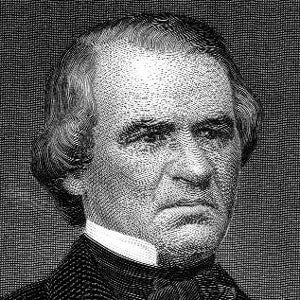Andrew Johnson
17th president - 1865-1869

Johnson grew up in great poverty in North Carolina and did not even learn to read until he was 17 (when his future wife started to teach him).
After a brief career as a tailor, he cut his political teeth in Tennessee, becoming governor in 1853 and a US senator in 1857. He defended the rights of southern states in Congress, but was the only southern senator who refused to resign when his state seceded. Lincoln made him military governor after Unionist forces overran Tennessee in 1862, and, although his sympathies were Democrat, he was elected Lincoln's Vice-President on a National Union Party ticket.
After Lincoln's murder, he began his presidency with a policy of "leniency, reconciliation and amnesty" towards the defeated south. But the Radical branch of the Republican Party placed him under severe pressure to adopt a less conciliatory approach – arguing, with some justice, that he was allowing reconstructed southern states to replace slavery with racially discriminatory "black codes".
The rest of Johnson's presidency was dominated by this power struggle. Radical legislation dealing with former slaves was vetoed by Johnson; the Radicals then mustered enough votes to override his veto – the first time this had ever happened. They followed this with the Civil Rights Act of 1866, which established negroes as American citizens and forbade discrimination against them, as well as initiating the Fourteenth Amendment (specifying that no state should "deprive any person of life, liberty, or property, without due process of law") in the face of furious opposition from the south. (The Ku Klux Klan was founded in Tennessee the same year). Johnson exercised his veto 29 times, and was overridden 15 times.
Congressional elections in the autumn of 1866 strengthened the Radicals' grip. Legislation such as the Reconstruction Act of 1867 placed the southern states under military rule. Laws were also passed restricting the president's powers. It was an alleged violation of one of these, the Tenure of Office Act, that led to the House voting for Johnson's impeachment. He was tried by the Senate in 1868 and acquitted by one vote. He was not nominated as a candidate in that year's presidential election and retired to Tennessee. He returned to Washington in 1875, shortly before his death, after being elected – uniquely for an ex-president – to the Senate.
In his own words
"This is a country for white men, and by God, as long as I am President, it shall be a government for white men."
"There are no good laws but such as repeal other laws."
In others' words
"One of the people by birth, he has remained so by conviction, continually referring to his origin… He was indifferent to money and careless of praise or censure." Jefferson Davis
"Johnson is an insolent drunken brute in comparison with which Caligula's horse was respectable."Senator Charles Sumner
Minutiae
Johnson's inaugural address as Vice-President was rambling and incoherent. He had been drinking whiskey to dull the pain of typhoid fever.
Johnson married at 18. His bride, Eliza McCardle, was 16 - the youngest age at which any First Lady has married.
As a teenager, Johnson and his brother William were apprenticed to a tailor in Raleigh, North Carolina. After two years, they ran away, breaking their contract. The tailor offered a $10 reward for their return.
It was under Johnson's presidency, in 1867, that Alaska was purchased from Russia for $7.2m. Residents were given three years to decide whether to stay in Alaska as Americans or move to Russia.
Join our commenting forum
Join thought-provoking conversations, follow other Independent readers and see their replies
Comments
Bookmark popover
Removed from bookmarks